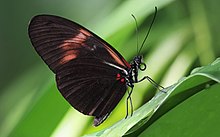
Back Heliconius melpomene AST Heliconius melpomene CEB Heliconius melpomene Czech Heliconius melpomene Spanish پروانه نامهرسان Persian Heliconius melpomene French Heliconius melpomene Dutch Heliconius melpomene Russian Heliconius melpomene Swedish Heliconius melpomene Turkish
| Common postman | |
|---|---|
| H.melpomene martinae, Colombia | |
| Scientific classification | |
| Domain: | Eukaryota |
| Kingdom: | Animalia |
| Phylum: | Arthropoda |
| Class: | Insecta |
| Order: | Lepidoptera |
| Family: | Nymphalidae |
| Genus: | Heliconius |
| Species: | H. melpomene
|
| Binomial name | |
| Heliconius melpomene | |
| Subspecies | |
|
Many, see genetics | |
| Synonyms | |
|
Papilio melpomene (Linnaeus, 1758) | |


Heliconius melpomene, the postman butterfly, common postman or simply postman, is a brightly colored, geographically variable butterfly species found throughout Central and South America. It was first described by Carl Linnaeus in his 1758 10th edition of Systema Naturae. Its coloration coevolved with another member of the genus, H. erato as a warning to predators of its inedibility; this is an example of Müllerian mimicry.[1] H. melpomene was one of the first butterfly species observed to forage for pollen, a behavior that is common in other insect groups but rare in butterflies.[2] Because of the recent rapid evolutionary radiation of the genus Heliconius and overlapping of its habitat with other related species, H. melpomene has been the subject of extensive study on speciation and hybridization. These hybrids tend to have low fitness as they look different from the original species and no longer exhibit Müllerian mimicry.
Heliconius melpomene possesses ultraviolet vision which enhances its ability to distinguish subtle differences between markings on the wings of other butterflies.[3] This allows the butterfly to avoid mating with other species that share the same geographic range.
- ^ Giraldo, Nathalia; Salazar, Camilo; Jiggins, Chris D.; Bermingham, Eldredge; Linares, Mauricio (28 November 2008). "Two sisters in the same dress: Heliconius cryptic species". BMC Evolutionary Biology. 8 (1): 324. Bibcode:2008BMCEE...8..324G. doi:10.1186/1471-2148-8-324. ISSN 1471-2148. PMC 2632674. PMID 19040737.
- ^ Gilbert, Lawrence (September 2017). "Pollen feeding and reproductive biology of Heliconius butterflies". Proceedings of the National Academy of Sciences. 69 (6): 1403–1407. Bibcode:1972PNAS...69.1403G. doi:10.1073/pnas.69.6.1403. PMC 426712. PMID 16591992.
- ^ Briscoe, Adriana (September 2017). "Positive selection of a duplicated UV-sensitive visual pigment coincides with wing pigment evolution in Heliconius butterflies". Proceedings of the National Academy of Sciences. 107 (8): 3628–3633. doi:10.1073/pnas.0910085107. PMC 2840532. PMID 20133601.